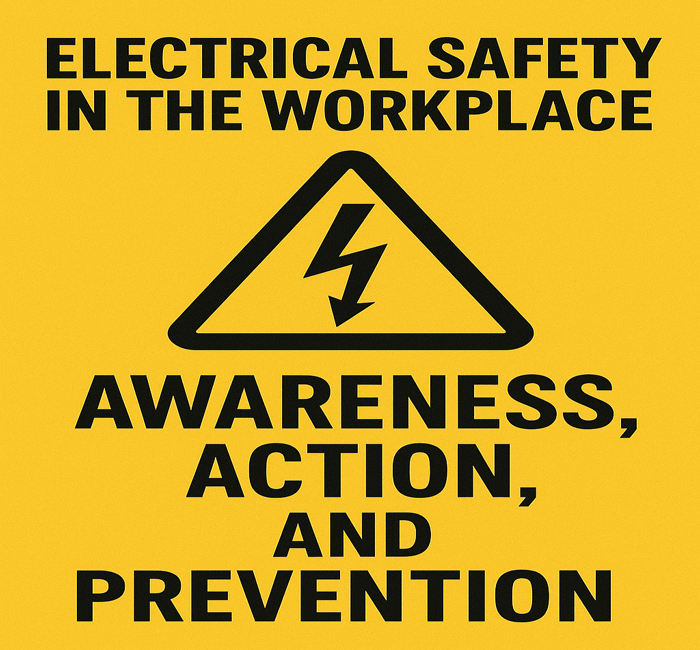Electrical safety is a critical aspect of workplace health and safety, often underestimated until an incident occurs. From minor shocks to fatal electrocutions, electrical hazards can cause severe harm and lead to significant downtime, legal liabilities, and financial loss. Ensuring electrical safety in the workplace begins with awareness, followed by proactive action and ongoing prevention.

Awareness
The first step in maintaining electrical safety is understanding the potential risks. Common electrical hazards include:
- Exposed live wires
- Faulty equipment or wiring
- Overloaded circuits
- Wet or damp working conditions
- Improper use of extension cords
- Lack of grounding
Employees must be trained to recognize these risks and understand how to report and avoid them. Awareness campaigns, safety signs, and regular safety talks can reinforce the importance of electrical safety.
Action
Organizations should take concrete steps to mitigate risks. This includes:
- Conducting routine inspections of electrical systems and equipment
- Ensuring all installations comply with national electrical codes
- Providing Personal Protective Equipment (PPE) for high-risk tasks
- Using proper lockout/tagout (LOTO) procedures when working on energized systems
- Clearly labeling electrical panels and hazard zones
It’s vital to encourage a safety-first culture where employees feel responsible and empowered to act when they spot a hazard.
Prevention
Prevention focuses on long-term strategies to ensure electrical safety. This includes:
- Regular maintenance and timely replacement of old wiring and equipment
- Installation of circuit breakers and surge protectors
- Keeping electrical areas dry and clean
- Limiting access to high-voltage areas to authorized personnel only
- Ongoing employee training and refresher courses
By combining awareness, prompt action, and consistent prevention, organizations can significantly reduce electrical hazards. A safe workplace is not just a legal requirement—it’s a moral responsibility that protects lives and supports productivity.
Read also:-
- Top 10 Safety Hazards in the Workplace and How to Avoid Them
- Walking the Safe Path: Strategies to Prevent Slips, Trips, and Falls
- Electric Safety at Work: A Guide for Employees and Employers
- Green Barriers: Nature’s Shield Against Pollution
- E-Waste and Environmental Safety: A Ticking Time Bomb
- The Silent Threat: How Air Pollution Affects Human Health
